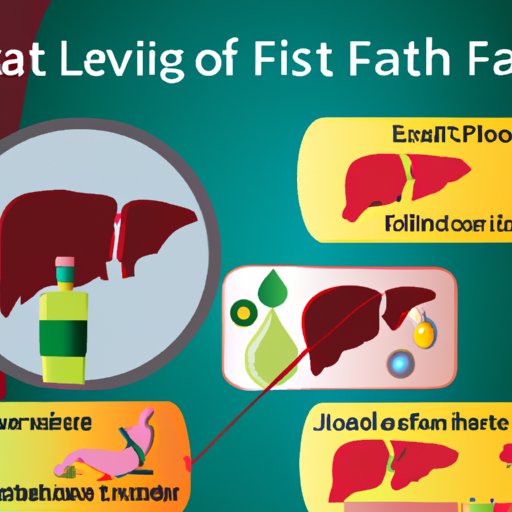
Is Fatty Liver Disease Reversible?
According to the World Gastroenterology Organisation, Fatty Liver Disease affects roughly 25% of adults worldwide. This disease is a growing health concern due to its links with other conditions such as obesity, insulin resistance, and metabolic syndrome. However, many people are unaware of what exactly Fatty Liver Disease is and whether it is reversible. In this article, we will explore the causes, symptoms, and how you can reverse Fatty Liver Disease.
Discussing the Causes and Symptoms of Fatty Liver Disease and How It Can Be Reversed
Fatty Liver Disease is characterized by excessive accumulation of fat in the liver cells. This accumulation is caused by several factors such as obesity, high cholesterol, Type 2 diabetes, and excessive alcohol intake. The liver is a vital organ that plays a crucial role in metabolism, and a healthy liver is essential for the proper functioning of the body. If left untreated, Fatty Liver Disease can lead to inflammation and scarring of the liver, known as cirrhosis.
The symptoms of Fatty Liver Disease are non-specific, making it difficult to diagnose in its early stages. Symptoms may include fatigue, weakness, and abdominal pain. As the disease progresses, symptoms may worsen, leading to liver failure and other complications.
The good news is that Fatty Liver Disease can be reversed. The treatment approach focuses on lifestyle changes such as diet and exercise, and medical treatments if necessary. By following these measures, patients can improve their liver health and reduce the risk of developing more severe conditions.
Evidence suggests that lifestyle modifications are effective methods in reversing non-alcoholic Fatty Liver Disease. Studies show that a 5-10% weight reduction is linked to excellent outcomes in reducing liver fat and improving liver function. Also, eliminating sugary and processed foods from the diet and promoting regular physical activity can have a positive impact on liver health.
Examining the Role of Diet and Exercise in Reversing Fatty Liver Disease
In terms of nutrition, a diet consisting of whole foods such as fruits, vegetables, and whole grains, and limiting saturated and trans fats can promote liver health. Foods such as fish, nuts, and seeds that are high in omega-3 fatty acids have anti-inflammatory properties that help to decrease inflammation in the liver. On the other hand, processed foods and sugar-sweetened drinks can contribute to fatty liver disease and inflammation, thus should be avoided.
Exercise can also play a vital role in reversing Fatty Liver Disease. Aerobic exercises such as running, swimming, or cycling can burn calories, reduce visceral fat, and improve insulin sensitivity. Resistance training can also help build muscle mass and decrease fat accumulation in the liver. Experts suggest at least 150 minutes of moderate-intensity aerobic exercise each week and 2-3 days of resistance training for significant benefits.
Detailing Medical Treatments for Fatty Liver Disease
In some cases, lifestyle interventions alone may not be enough to reverse or manage fatty liver disease. In such cases, medical treatments such as prescription medications, surgery, and alternative therapies may be necessary.
Prescription medications such as Metformin and Vitamin E are used to treat fatty liver disease. Metformin improves insulin sensitivity and is effective in reducing liver fat, while Vitamin E acts as an antioxidant and reduces inflammation. Additionally, in severe cases, surgical procedures such as liver transplant or weight-loss surgery may be considered. However, it is essential to talk to a healthcare provider before considering any medical procedure to treat Fatty Liver Disease.
Highlighting Success Stories of Fatty Liver Disease Reversal
While lifestyle modifications and medical treatments can be challenging for some, many people have had success stories in reversing Fatty Liver Disease. These people share their experiences through various platforms, which can be inspiring and encourage those struggling with the disease.
It’s essential to understand that the path to reversal of Fatty Liver Disease may require patience and perseverance. One should be committed to the lifestyle changes suggested by healthcare providers and medical professionals to lead a healthy life.
Debunking Common Myths about Fatty Liver Disease
There are many misconceptions about Fatty Liver Disease, emphasizing the importance of understanding the disease’s facts. Some people may believe that only alcoholics develop Fatty Liver Disease; however, Non-Alcoholic Fatty Liver Disease (NAFLD) is more prevalent. Others may think that Fatty Liver Disease is not reversible, and medical treatment is the only solution. As discussed earlier, Fatty Liver Disease is reversible, and lifestyle changes can help manage the disease. It is crucial to seek accurate information and guidance from healthcare professionals to understand and treat Fatty Liver Disease correctly.
Conclusion
In conclusion, Fatty Liver Disease is a growing health concern that can have severe consequences if left untreated. However, it is reversible through lifestyle interventions and medical treatments if necessary. Proper nutrition, regular physical activity, and medical treatment after consulting a healthcare professional can significantly improve liver health. Understanding the facts, breaking myths, and seeking reliable information can help manage and reverse Fatty Liver Disease.





